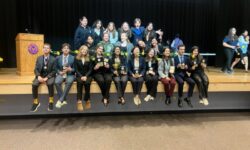Hometown Weekly Correspondent
Part III: Lessons that I Cherish from Afghanistan and Morocco
“Illuminating the Dark Side of the Moon” is a series written by Hometown Weekly Correspondent Ethan Lee, a student at Needham High School. As a reporter, Ethan has focused on revealing truths about misunderstood cultures around the global community. Thus, when Ethan noted absence of positive media about Islam in the news industry in recent years, he decided to learn about Muslim culture and life in Islamic nations for himself. This three-part series relates Ethan’s experiences working with people and schools in Afghanistan and Morocco. In this third and final piece, Ethan relates lessons that he has learned from various people he has met and worked with, and how these experiences culminate to show that we as a global community are, in the end, all humans.
This final installment of “Illuminating the Dark Side of the Moon” revisits my experiences with Afghanistan and Morocco over the last year and reflects on the lessons I learned from the diverse range of people I met, taught, and lived with. Specifically highlighted will be three important subjects in the customs of Afghanistan and Morocco: passion for education, family life, and hospitality.
In both countries, people showed a passion for education that was unlike any that I had seen before. Despite the numerous obstacles, children and students in both countries made impressive efforts to overcome the challenges in their educational development.
The Afghan student who I tutored, M, had to work many times harder than others in order to receive the same schooling opportunities. For example, M took a collective bus with other female students in order to stay safe on the way to school. In order to gain an education in English, she had put in effort to find tutors, such as me, who could help advance her education.
In Morocco, my students had used creative methods in order to overcome the outdated equipment they had. The students who wanted to learn to code used old-fashioned languages such as Pascal, while those who wanted to use advanced software crowded together around a single high-tech laptop computer at their facility. Additionally, the students were so dedicated to learning that they and I would spend long times using Google Translate to communicate with each other.
To me, all of these experiences revealed the commitment that both Afghan and Moroccan students had towards achieving their educations, and the measures they would go to reach them.
In both countries, a stunning emphasis on family life was distinctive and salient. Although M lived around 100 miles away from her family, she would always make an effort to visit them regularly. Additionally, M’s conversations with her family were always the experiences that she recounted most fondly; I can even recall how content and satisfied she seemed when discussing her trips back home.
While living in Morocco, I also saw similar levels of familial dedication. While living with my host family in the heart of Rabat’s Medina (the old section of the city), I saw an interesting house structure that served to bring my host family closer together. Meals with my family would be lengthy, primarily because the members of my host family would purposefully take time out of their days to spend time and discuss events with each other. Additionally, the host family also had its own “family room” in which they and their guests could gather and converse at specific times of the day.
Seeing these qualities of life in both M’s and my Moroccan host family’s lives, I acknowledged the admirable prominence that family had in both of their countries.
One final significant aspect of life that was conspicuous during my experiences was the concept of hospitality. In Islam, hosts are expected to treat any guests like family; especially in Morocco, many people have considered this rule of hospitality to encompass any foreigners and tourists that they meet, as well. Thus, I experienced many situations in which I received assistance, or simply had friendly conversations, with complete strangers.
For example, when I was once lost in the alleys of Salé, I had been completely unsure of which direction the taxi station was. Fortunately, a Moroccan nearby had noticed my plight, and despite his limited English, led me to the taxi station, explaining to me on the way that he found great satisfaction in helping others. Another event that showed the immense hospitality of Moroccans occurred as I walked the streets of the Medina of Rabat. Wandering through the many alleys, I had been surprised when a Moroccan at an open-air restaurant had called out to me. Upon approaching him, I had discovered that he was inviting me to eat with him, explaining that he would be glad to show Moroccan food to a foreigner. Although I had politely declined, I had felt honored and welcome in this country.
Sitting on the plane on my way back home from Morocco, I reflected on the experiences I had had over the past year with Afghan and Moroccan people. Considering all that I had learned, I came to a final conclusion: humans are humans everywhere.
Throughout my interactions with students and adults who are separated from me by distance, language, and culture, I couldn’t help but understand how similar I was to them. We had similar topics that we cherished and pursued, including education and family. Additionally, although mainstream media has often used negative information to alienate countries like Afghanistan and Morocco, I can now recognize that behind reports such as those lie positive history, culture and traditions that we can respect and admire.
Ultimately, the traditions that others uphold should not force us to distance ourselves from them. Instead, we should learn about others and understand what differences and similarities we have. Only by doing this can we appreciate the positive aspects of life in other nations, and find success in celebrating diversity in this global community.
It has been a pleasure and an honor relaying the lessons I have gained from the opportunities I have had with these two countries to the Needham community, and I thank all readers who have followed “Illuminating the Dark Side of the Moon.” Please feel free to contact me about any comments or questions you may have had about this series, as I am always willing to discuss and share my experiences.
Photos courtesy of Wikimedia Commons
























